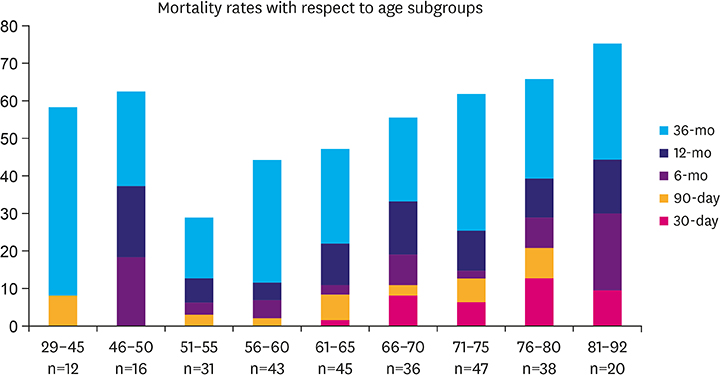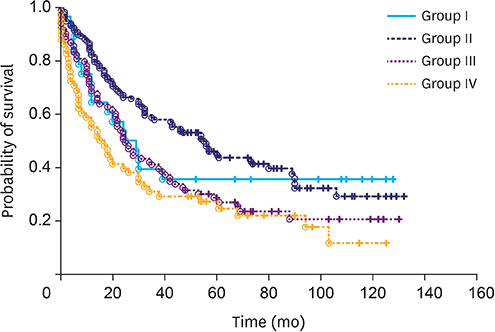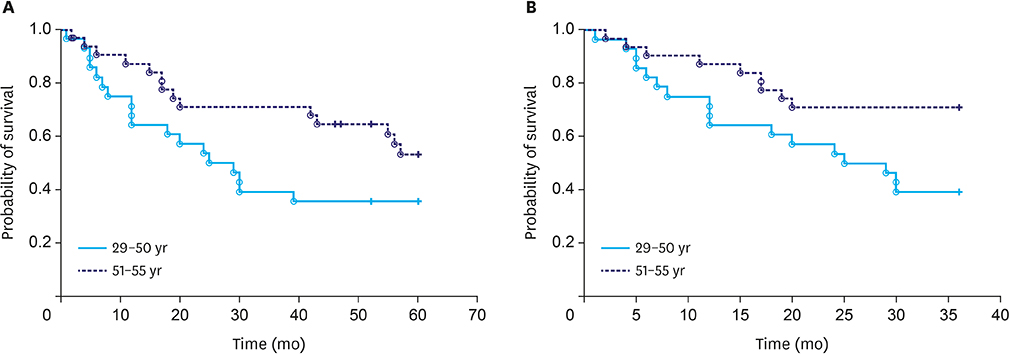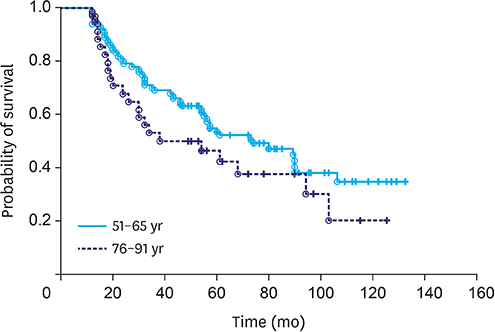J Gastric Cancer.
2019 Jun;19(2):202-211. 10.5230/jgc.2019.19.e16.
Extremely High Mortality Rate after a Successful Gastrectomy for Cancer in Older Adults
- Affiliations
-
- 1Department of Oncological Surgery, Gdynia Oncology Centre, Pomeranian Hospitals, Gdynia, Poland. maccies@gumed.edu.pl
- 2Division of Propedeutics of Oncology, Medical University of Gdańsk, Gdańsk, Poland.
- 3Department of Oncological Surgery, Medical University of Gdańsk, Gdańsk, Poland.
- KMID: 2449941
- DOI: http://doi.org/10.5230/jgc.2019.19.e16
Abstract
- PURPOSE
Poor physiological reserve for withstanding major cancer surgery in older adults is an important concern in the selection of patients for oncologic gastrectomy. The present study aimed to analyze mortality patterns among patients who underwent gastrectomy for cancer according to age groups. The primary outcomes of this study were early- and middle-term results: 30-day and 3-, 6-, 12-, and 36-month mortality rates.
MATERIALS AND METHODS
A retrospective review of 288 patients who underwent surgical resection for gastric cancer in two centers was carried out. Patients were stratified into four groups according to age: 29-50 years (group I, n=27), 51-65 years (group II, n=117), 66-75 years (group III, n=81), and 76-92 years (group IV, n=58). Statistical calculations focused on the differences in the survival rates between groups I and II as well as between groups II and IV.
RESULTS
The middle-aged patients (group II) had significantly better 3-year survival than either the youngest (group I) or the oldest patients (group IV). The 6-month mortality rates were 16.9% in group III and 29.3% in group IV. Two-thirds of the patients from groups III and IV who died between 2 and 6 months after surgery had an uneventful postoperative course.
CONCLUSIONS
Age is an important prognostic factor of middle-term survival after gastrectomy for cancer. Geriatric assessment and better patient selection for major surgery for cancer are required to improve the outcome of gastrectomy for cancer in patients aged over 75 years.
Keyword
MeSH Terms
Figure
Reference
-
1. Ferlay J, Soerjomataram I, Dikshit R, Eser S, Mathers C, Rebelo M, et al. Cancer incidence and mortality worldwide: sources, methods and major patterns in GLOBOCAN 2012. Int J Cancer. 2015; 136:E359–E386.
Article2. Tran TB, Worhunsky DJ, Squires MH 3rd, Jin LX, Spolverato G, Votanopoulos KI, et al. Outcomes of gastric cancer resection in octogenarians: a multi-institutional study of the U.S. gastric cancer collaborative. Ann Surg Oncol. 2015; 22:4371–4379.
Article3. Lu J, Cao LL, Zheng CH, Li P, Xie JW, Wang JB, et al. The preoperative frailty versus inflammation-based prognostic score: which is better as an objective predictor for gastric cancer patients 80 years and older? Ann Surg Oncol. 2017; 24:754–762.4. Coniglio A, Tiberio GA, Busti M, Gaverini G, Baiocchi L, Piardi T, et al. Surgical treatment for gastric carcinoma in the elderly. J Surg Oncol. 2004; 88:201–205.
Article5. Zhou CJ, Chen FF, Zhuang CL, Pang WY, Zhang FY, Huang DD, et al. Feasibility of radical gastrectomy for elderly patients with gastric cancer. Eur J Surg Oncol. 2016; 42:303–311.
Article6. Biondi A, Cananzi FC, Persiani R, Papa V, Degiuli M, Doglietto GB, et al. The road to curative surgery in gastric cancer treatment: a different path in the elderly? J Am Coll Surg. 2012; 215:858–867.
Article7. Hsu JT, Liu MS, Wang F, Chang CJ, Hwang TL, Jan YY, et al. Standard radical gastrectomy in octogenarians and nonagenarians with gastric cancer: are short-term surgical results and long-term survival substantial? J Gastrointest Surg. 2012; 16:728–737.
Article8. Kim JH, Chin HM, Jun KH. Surgical outcomes and survival after gastrectomy in octogenarians with gastric cancer. J Surg Res. 2015; 198:80–86.
Article9. Dindo D, Demartines N, Clavien PA. Classification of surgical complications: a new proposal with evaluation in a cohort of 6336 patients and results of a survey. Ann Surg. 2004; 240:205–213.10. Edge SB. American Joint Committee on Cancer. AJCC Cancer Staging Manual. 7th ed. New York (NY): Springer;2010.11. Takeshita H, Ichikawa D, Komatsu S, Kubota T, Okamoto K, Shiozaki A, et al. Surgical outcomes of gastrectomy for elderly patients with gastric cancer. World J Surg. 2013; 37:2891–2898.
Article12. Kunisaki C, Akiyama H, Nomura M, Matsuda G, Otsuka Y, Ono HA, et al. Comparison of surgical outcomes of gastric cancer in elderly and middle-aged patients. Am J Surg. 2006; 191:216–224.
Article13. Sakurai K, Muguruma K, Nagahara H, Kimura K, Toyokawa T, Amano R, et al. The outcome of surgical treatment for elderly patients with gastric carcinoma. J Surg Oncol. 2015; 111:848–854.
Article14. Saif MW, Makrilia N, Zalonis A, Merikas M, Syrigos K. Gastric cancer in the elderly: an overview. Eur J Surg Oncol. 2010; 36:709–717.
Article15. Central Statistical Office (PL). Chapter VII: population development and changes in population structure in Poland in 1950–2016. Demographic Yearbook of Poland 2017. Warsaw: Central Statistical Office;2017. p. 60.16. U.S. Census Bureau. Current Population Survey, Annual Social and Economic Supplement. Suitland (MD): U.S. Census Bureau;2009.17. Smith BR, Stabile BE. Extreme aggressiveness and lethality of gastric adenocarcinoma in the very young. Arch Surg. 2009; 144:506–510.
Article18. Saito H, Takaya S, Fukumoto Y, Osaki T, Tatebe S, Ikeguchi M. Clinicopathologic characteristics and prognosis of gastric cancer in young patients. Yonago Acta Med. 2012; 55:57–61.19. Braga-Neto MB, Carneiro JG, de Castro Barbosa AM, Silva IS, Maia DC, Maciel FS, et al. Clinical characteristics of distal gastric cancer in young adults from Northeastern Brazil. BMC Cancer. 2018; 18:131–137.
Article20. Park JC, Lee YC, Kim JH, Kim YJ, Lee SK, Hyung WJ, et al. Clinicopathological aspects and prognostic value with respect to age: an analysis of 3,362 consecutive gastric cancer patients. J Surg Oncol. 2009; 99:395–401.
Article21. Santoro R, Carboni F, Lepiane P, Ettorre GM, Santoro E. Clinicopathological features and prognosis of gastric cancer in young European adults. Br J Surg. 2007; 94:737–742.
Article22. Al-Refaie WB, Hu CY, Pisters PW, Chang GJ. Gastric adenocarcinoma in young patients: a population-based appraisal. Ann Surg Oncol. 2011; 18:2800–2807.
Article23. Isobe T, Hashimoto K, Kizaki J, Miyagi M, Aoyagi K, Koufuji K, et al. Characteristics and prognosis of gastric cancer in young patients. Oncol Rep. 2013; 30:43–49.
Article24. Choe YR, Joh JY, Kim YP. Association between frailty and readmission within one year after gastrectomy in older patients with gastric cancer. J Geriatr Oncol. 2017; 8:185–189.
Article25. Shen Y, Hao Q, Zhou J, Dong B. The impact of frailty and sarcopenia on postoperative outcomes in older patients undergoing gastrectomy surgery: a systematic review and meta-analysis. BMC Geriatr. 2017; 17:188–195.
Article
- Full Text Links
- Actions
-
Cited
- CITED
-
- Close
- Share
- Similar articles
-
- Comparative analysis of successful aging in young-old and old-old adults based on Rowe and Kahn’s model: A secondary data analysis
- Single-incision Laparoscopic Gastrectomy for Gastric Cancer
- Intervention Strategies for Older Adults with Diabetes
- Clinical Analysis of 329 Cases of Total Gastrectomy
- Health Literacy, Cancer Knowledge, and Cancer Preventive Behaviors among Rural Older Adults





